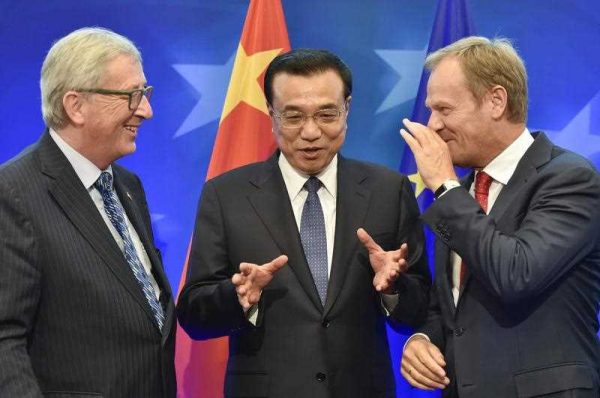European capitals play an important role in Beijing’s strategy, and their combined efforts can influence Beijing to agree with measures that may be out of its comfort zone.
Chinese Premier Li Keqiang visited Brussels in late June 2015 — the height of the Greek debt crisis. He presented China as ‘a true friend of the European Union’, adding that it wants ‘a prosperous EU, a united Europe and a strong Europe’.
Europe can certainly use a share of the US$4 trillion in reserves that Beijing holds. And China wants to invest, as is evident from its doubling of investments into the EU 28-economies to a new record of $18 billion in 2014 following a 2013 dip. Beijing is promoting a series of initiatives that ultimately aim to strengthen its domestic economy as well as its influence in the world. These include the Asian Infrastructure Investment Bank (AIIB) — capitalised at US$100 billion — and the One Belt, One Road (OBOR) initiative. The latter aims to connect the Chinese and European markets by land through Central Asia, and by sea through Southeast Asia and Africa.
China has also been negotiating various economic agreements and participating in the Juncker Investment Plan, launched in 2014 as the flagship project of Jean-Claude Juncker – the President of the EU’s executive arm – to unlock investment in the EU. From China’s perspective, this initiative neatly fits its own economic and geopolitical agenda, and Chinese banks are reportedly ready to invest billions ‘if the right conditions are met.’
Clearly, Europe stands to gain from these undertakings. But as China unfolds its own policies, a shared European framework on how each of Beijing’s goals impact on European political and economic interests can help to press China to conform to European standards.
The Connectivity Platform aims to improve infrastructure and transport links and to develop collaboration between European and Chinese projects. Its launch shows that Brussels is capable of reshaping Asian ideas into joint strategy and action.
It was high time. In March, 15 EU member states joined the AIIB. Beijing succeeded in playing off European capitals against each other; states tumbled over one another to court Beijing. The episode was telling of Europe’s China policy of recent years: economic diplomacy dominates. European capitals have failed to coordinate a shared strategic vision of a world in which China is more influential.
Cracks have already begun to appear as EU members aspire not to repeat the faulty, lagging response to the AIIB initiative and instead develop a more coordinated approach to EU–China relations. Hungary already signed an agreement under the OBOR-flag, and France recently signalled its intention to be next. The port of Antwerp in Belgium has signed a collaboration agreement with the China Development Bank and set up a special task force to enable it to benefit from the maritime Silk Road.
Coordinated cooperation with China under the guise of the Connectivity Platform is therefore important. The European Union, by taking action before member states do so individually, moderates the internal competition for Chinese favour. EU member states are already legally held to certain EU-standards, including on government procurement, quality and labour. The Platform is a way for Europe to continue to export its standards in the face of massive China-led infrastructure spending.
The European Union’s negotiations with China on a bilateral investment agreement serve as a good illustration of the benefits of coordinated European action. A collective effort allows Europe to pull China closer to its position in areas such as market access, transparency, liberalisation of investments and a level playing field for companies. This is necessary. The widespread euphoria when China joined the WTO in 2001 is gradually being replaced by complaints by European companies about lagging legislative enforcement and unfair competition in China.
Moreover, if the AIIB, the One Belt One Road and other Chinese initiatives were to become a reflection of the recent Chinese reality — including repressing civil liberties, reversing political reforms and continued influence of the state on the economy — Europe for the time being has reason to be worried about a world where Chinese standards dominate.
The AIIB experience served as a wakeup call to many in Europe. While there is no need to develop one answer or one voice for everything, at the very least there should be a shared framework for cooperation with China. The European Union and its member states are beginning to see eye-to-eye on this, and that is a good start.
Maaike Okano-Heijmans is a senior research fellow at the Clingendael Institute, The Hague. Daniel Lanting is a research assistant at this same institute.
This article was first published here on the EUobserver website.


This post seems completely European centric. It is quite one sided advocate for the European standards and I am not sure that is either the best way for all European countries to work with China or indeed for a better world.
First, are the European standards the best standards with no room to improve? I think those people who hold that view may be too arrogant and out of touch.
Secondly, if it is to work with in a collaborative way, why should only the European standards need to be followed and why not also consider a compromise between the European standards and the presumably different Chinese or Asian standards?
Given the quite diverse situations among the European countries, the benefits and otherwise of working with China may be quite different. As a result, the member states of Europe are likely to seek more cooperative solutions as opposed to the authors’ advocate of a consolidated approach to hold the European standards.
On China’s part, it is likely to invest in countries where maximum benefits for both partners can be expected to achieve.